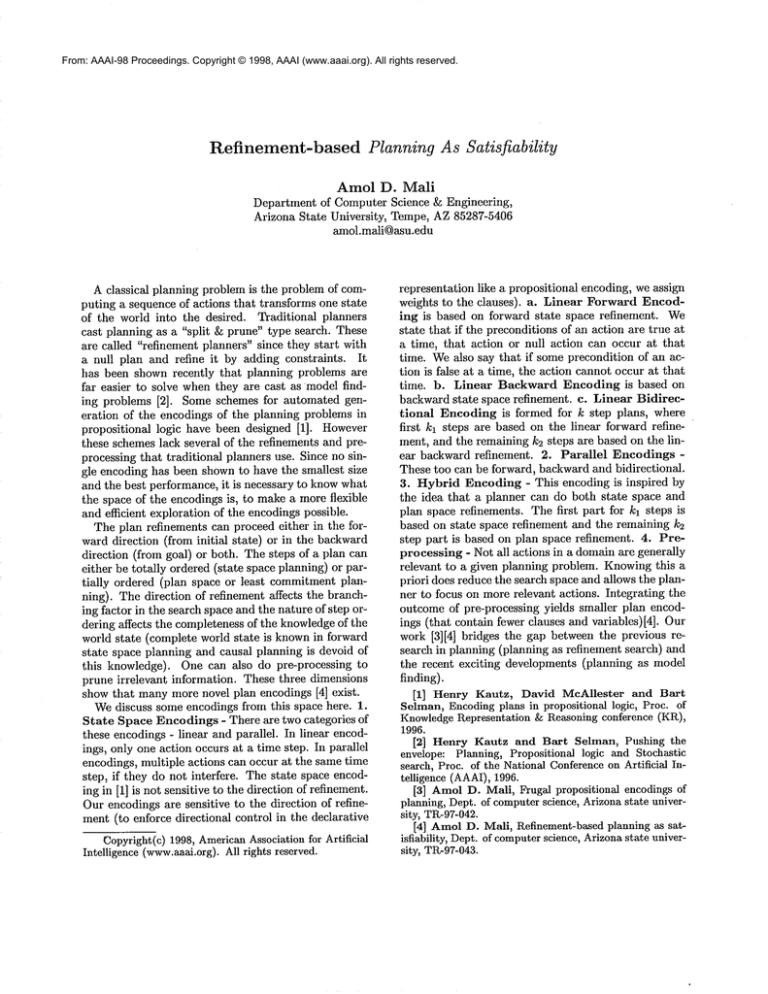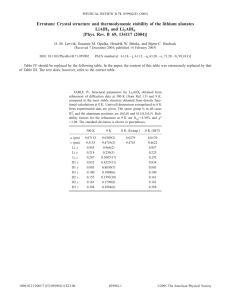
From: AAAI-98 Proceedings. Copyright © 1998, AAAI (www.aaai.org). All rights reserved.
Refinement-based
Planning
As Satisfiability
Amol D. Mali
Department of Computer Science & Engineering,
Arizona State University, Tempe, AZ85287-5406
amol.mali@asu.edu
A classical planning problem is the problem of computing a sequence of actions that transforms one state
of the world into the desired. Traditional planners
cast planning as a "split & prune" type search. These
are called "refinement planners" since they start with
a null plan and refine it by adding constraints. It
has been shown recently that planning problems are
far easier to solve when they are cast as model finding problems [2]. Someschemes for automated generation of the encodings of the planning problems in
propositional logic have been designed [1]. However
these schemeslack several of the refinements and preprocessing that traditional planners use. Since no single encoding has been shownto have the smallest size
and the best performance, it is necessary to knowwhat
the space of the encodings is, to makea more flexible
and efficient exploration of the encodings possible.
The plan refinements can proceed either in the forward direction (from initial state) or in the backward
direction (from goal) or both. The steps of a plan can
either be totally ordered (state space planning) or partially ordered (plan space or least commitmentplanning). The direction of refinement affects the branching factor in the search space and the nature of step ordering affects the completenessof the knowledgeof the
world state (complete world state is knownin forward
state space planning and causal planning is devoid of
this knowledge). One can also do pre-processing to
prune irrelevant information. These three dimensions
show that manymore novel plan encodings [4] exist.
Wediscuss someencodings from this space here. 1.
State Space Encodings - There are two categories of
these encodings - linear and parallel. In linear encodings, only one action occurs at a time step. In parallel
encodings, multiple actions can occur at the same time
step, if they do not interfere. The state space encoding in [1] is not sensitive to the direction of refinement.
Our encodings are sensitive to the direction of refinement(to enforce directional control in the declarative
(~opyright(c)1998, American
Associationfor Artificial
Intelligence (www.aaai.org).All rights reserved.
representation like a propositional encoding, we assign
weights to the clauses), a. Linear Forward Encoding is based on forward state space refinement. We
state that if the preconditions of an action are true at
a time, that action or null action can occur at that
time. Wealso say that if some precondition of an action is false at a time, the action cannot occur at that
time. b. Linear Backward Encoding is based on
backward state space refinement, e. Linear Bidirectional Encoding is formed for k step plans, where
first kl steps are based on the linear forward refinement, and the remaining k2 steps are based on the linear backward refinement. 2. Parallel Encodings These too can be forward, backwardand bidirectional.
3. Hybrid Encoding - This encoding is inspired by
the idea that a planner can do both state space and
plan space refinements. The first part for kl steps is
based on state space refinement and the remaining k2
step part is based on plan space refinement. 4. Preprocessing - Not all actions in a domainare generally
relevant to a given planning problem. Knowingthis a
priori does reduce the search space and allows the planner to focus on more relevant actions. Integrating the
outcome of pre-processing yields smaller plan encodings (that contain fewer clauses and variables)[4]. Our
work [3][4] bridges the gap between the previous research in planning (planning as refinement search) and
the recent exciting developments (planning as model
finding).
[1] Henry Kautz~ David McAllester and Bart
Selman, Encodingplans in propositional logic, Proc. of
KnowledgeRepresentation ~ Reasoningconference (KP~),
1996.
[2] Henry Kautz and Bart Selman, Pushing the
envelope: Planning, Propositional logic and Stochastic
search, Proc. of the National Conferenceon Artificial Intelligence (AAAI),1996.
[3] AmolD. Mall, Frugal propositional encodings of
planning, Dept. of computerscience, Arizonastate university, TR-97-042.
[4] AmolD. Mali, Refinement-basedplanning as satisfiability, Dept.of computerscience, Arizonastate university, T1~-97-043.







